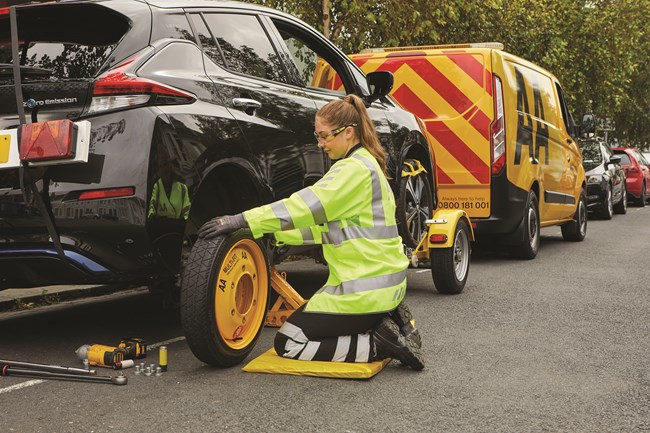- Orders open for Ineos Grenadier Commercial
- Toyota Hilux range gains new rally-inspired GR Sport II variant
- Remarketing: Pick of the bunch
- GA Commercial acquires first vans through Vanaways
- 'Luxury' tax on expensive pick-up trucks suggested
- ADVERTISEMENT FEATURE: Essential advice to avoid the van fleet ICE-berg
- ETRUX launches new Ford E-Transit Trizone
- Renault gives UK debut to Master E-Tech at CV Show
- Isuzu D-Max long-term test – Latest Report
- Isuzu D-Max V-Cross Steel Edition revealed
ADVERTISEMENT FEATURE: Thriving in a changing landscape
Date: Tuesday, December 13, 2022
By Stuart Thomas, director of fleet and accident management services at the AA.

The transition to alternatively-fuelled vehicles is rapidly accelerating. As a business dedicated to serving the nation’s fleets, we are keenly aware that guidance and insight are key to a smooth transition for businesses. That’s why our latest yellow paper, Alternative Fuels: Thriving in a Changing Landscape, sets out a road map to help businesses travel smoothly to the 2030 deadline, while also exploring the some of the questions many businesses have around alternative fuels adoption such as tax frameworks and charging innovation.
Charging innovations
Options for vehicle charging are finally improving for commercial vehicles. Operators of buses, trucks and vans can now take advantage of a one-stop shop service. Fleete has launched its charging-as-a-service model, installing high-powered DC charging equipment on-site, delivering between 60kW and 600kW depending on fleet requirements. For smaller operators, Fleete will build hubs in car parks and other places that can be used fleets with vehicles of all sizes.
Vehicle ownership for generation Netflix
In the consumer space, a growing number of businesses are offering an EV subscription service to help more drivers enter the EV marketplace – a space in which cars are subscribed to much in the same way you pay for Netflix or Disney+ each month. Meanwhile, the LCV sector is going rental. Northgate has launched what is currently the only LCV rental contract of its kind, where a single monthly payment covers a fully maintained vehicle and charger. Available to customers on a 12-month contract, the move builds on Northgate’s full-service rental proposal and wide choice of vehicles with installation of a 7kW charging unit, supplied and installed by Northgate’s charging partner ChargedEV. All charging units include servicing, maintenance and repair (SMR) within the monthly fee.
Taxation evolution
The move to alternative fuels will also see taxation evolution. AA president Edmund King is calling for the government to introduce a ‘Road Miles’ system, giving all drivers a tax-free mileage limit, after which they are charged per mile. This would make drivers think about the journey they’re undertaking – including business drivers – while promoting the use of cleaner, greener vehicles, which would pay less under this system.
Servicing EVs
Just like traditional ICE vehicles, EVs require regular servicing and checks to ensure roadworthiness. Prestige Fleet Servicing, part of the AA, has collated the following EV care tips for managers who have made the transition:
- Apply the same disciplines to EVs you apply to ICE vehicles – keep a record of all vehicles in your fleet and review the maintenance history of each vehicle
- Create software service reminders for each vehicle
- Follow your OEM’s recommended maintenance plan.
- There are fewer EV-capable garages in the UK compared with ICE, so make sure your garage provider can provide SMR coverage from the off
- Ensure that your SMR provider has the equipment and that technicians are trained to a minimum of Level 3
- Monitor your SMR spend. This can be done by using telematics data to identify trends and any areas of concern. EVs are renowned for their rapid acceleration which places increased strain on tyres. Using telematics data, you can quickly identify any drivers with a heavy right foot who would benefit from driver training
- Recent research (GiPA) has shown franchised dealers are charging a premium for EV servicing, so work with your fleet management provider to find the most cost-effective option for your business
Consider driver training to increase fleet understanding and wellbeing
This leads us to the driver training offered by Drivetech, part of the AA, which is helping fleets to make the transition to EVs by not forgetting the most important element in the switch – the driver. I mentioned above the issue of EV instant acceleration. This instant power poses a safety risk for untrained drivers. Regenerative braking is another issue with the potential to befuddle new EV drivers. This is when pressure is taken off the accelerator and the car slows down instead of coasting, which can pose a risk.
Driver training not only builds confidence and familiarity with new technology – it also has the potential to save lives. Additionally, it boosts driver awareness and instils a thrifty mindset through conserving the power used.
With you every step of the way
As with most things in life, we’re all at differing points on our journey to net zero. Wherever you are on yours, we want you to know we are with you, helping however we can every mile of the way.
To find out more about AA Business Services, and to download the yellow paper, please visit: https://www.linkedin.com/showcase/the-aa-business-services/
For media enquiries, please contact Prova Public Relations on 01926 776900 or email theaa@provapr.co.uk
View The WhatVan Digital Edition


